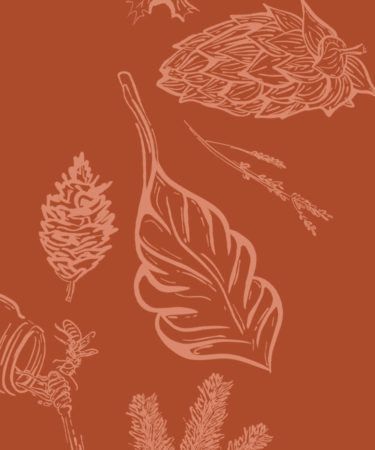As more brewers prioritize local ingredients and agriculture, a back-to-the-land ethos has become increasingly palpable in the beer industry. One way this philosophy has begun to resurface over the last decade is foraging, or searching for potable ingredients from one’s own property, nearby park or forest, or even neighbors’ backyards. Using ingredients harvested by hand, each foraged beer is a truly unique creation that brewers believe can enhance and encapsulate a sense of place.
Below are eight breweries hunting the local landscape for beer-friendly herbs, fruits, fungi, roots, and more raw ingredients for their foraged beers.
Fonta Flora
Morganton and Nebo, NC
Born in 2013 with a four-barrel brewhouse in downtown Morganton, N.C., Fonta Flora expanded its beer production with a nine-acre plot and 15-barrel brewhouse on Whippoorwill Farm, a former dairy farm near Lake James State Park in Nebo, N.C., in 2016. Along with foraging for ingredients for its beers, Fonta Flora hosts educational events and workshops so the public can join in on walking tours through the woods to find edible plants for future Fonta Flora products. Participants are eventually able to take home a bottle or 4-pack of the beer brewed after the hunt.
Forager Brewery / Humble Forager Brewery
Rochester, MN
Aptly named Forager Brewery, opened in 2015, recently announced it will launch a new brand in 2020, Humble Forager Brewery. “We decided to do it because of the constant calls and demands to get our beer into bars, liquor stores, and restaurants,” Austin Jevne, co-founder and brewer, told Growler magazine. The brand was created “as a workaround to Minnesota’s brewpub laws.” At present, its “scratch kitchen” and brewery offers seasonal dishes and beers made with local fruits, honeys, and grains.
Fullsteam Brewery
Durham, NC
Founded in 2010, Fullsteam Brewery emphasizes agricultural and culinary traditions of the “post-tobacco South” with beers like Farm’s Edge: Brumley Forest, made with ingredients foraged in Brumley Forest. A portion of proceeds is given back to the non-profit that maintains the public nature preserve.
Highland Park Brewery
Los Angeles, CA
L.A.’s Highland Park Brewery, opened in 2015, is known for its fun, funky brews like its Twiced Jura Blend, a farmhouse-style saison fermented in French oak puncheon barrels with house-mixed cultures along with spent whole-cluster Pinot Noir, Gamay, and Trousseau grapes from nearby Whitecraft Winery of Santa Barbara. Recently, Highland Park collaborated with Allagash Brewing on a pilsner made with local California grains and hops.
Scratch Brewing Company
Ava, IL
Scratch, located five miles from the Shawnee National Forest, is one of the small breweries that put foraged beer on the map, albeit from a fairly remote location. It aims to showcase “Southern Illinois terroir” with its beer (and pizza!) made with foraged ingredients like nettle, elderberry, ginger, maple sap, and chanterelle mushrooms. A majority of Scratch’s beers are sold in its taproom in Ava, Ill., as well as the newer Serpent Room opened in 2017. A select amount is distributed in-state and to a few neighboring states.
Urban Farm Fermentory
Portland, ME
“Fermentor” and culinary rising star Eli Cayer founded Urban Farm Fermentory in 2010. The fermentory produces beer, cider, mead, kombucha, and jun with foraged ingredients from Cayer’s home state of Maine. “Foraging is a huge part of what we do,” Urban Farm Fermentory says on its website. “Through foraging, we’re able to highlight what is growing seasonally as it’s still in season.” Beers include Lavender Lager and Saison de Gruit, a Belgian-style farmhouse ale made with bitter herbs instead of hops.
West Kill Brewing
West Kill, NY
West Kill Brewing recently celebrated a 2019 Great American Beer Festival win for its Kaaterskill IPA, but juicy brews aren’t all brewmaster Patrick “P.J.” Allen excels in. Working on a farm brewery in New York’s Catskill region, Allen utilizes the 127-acre property to forage unusual ingredients like knotweed for his rotating and “seasonally dependent” beers. Forsaken Fields, a mixed-culture saison with creeping thyme and spruce tips from the brewery’s surroundings, is currently on tap. The farm brewery also produces its own maple syrup.
Wunderkammer Bier
Greensboro Bend, VT
Hill Farmstead head brewer and production manager Vasilios Glestos started Wunderkammer as a homebrewing project and now produces his (extremely limited) foraged beers to sell. One release, From the Ruins of a Subterranean Feasting Hall, is made with mixed cultures along with cedar, spruce, fir, and pine tips foraged in Vermont.
